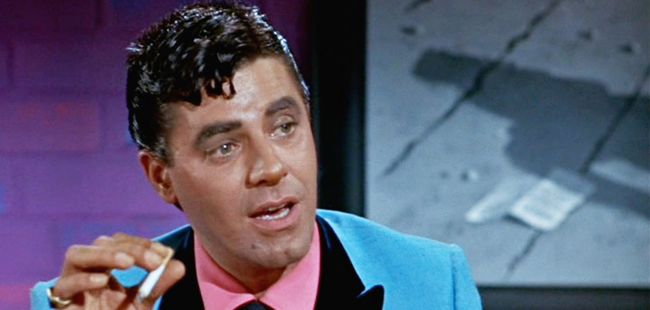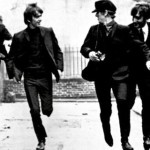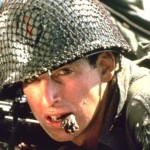
Paradox completists eventually must turn to la mystere de Jerry — why is it that French film masters such as Godard and Truffaut so loved Jerry Lewis?
The Franco-Lewis thing has become a well-worn joke — something to chew on with your Freedom Fries — but it’s a safe bet the directors weren’t thinking of the braying, pratfalling side of the American comedian.
Instead, the new wavers cited Lewis’ work from the early 1960s — including what arguably are his best films as an actor and director: “The Nutty Professor” and “The Bellboy.”
Paramount, Lewis’ longtime studio, has released both titles in splendid widescreen versions, along with seven of his other films. Some titles come with full or partial commentaries from Lewis and his pal Steve Lawrence; other modest bonus features are spread about the collection.
“The Nutty Professor,” from 1963, earns the collection’s only Special Edition tag with a vivid transfer, feature-length commentary, making-of featurette and a half-hour career survey called “Jerry Lewis at Work.” Screen tests, outtakes and promos complete the package. Paramount rarely breaks a sweat with extras, but this is a solid collection.
Lewis tells how as a kid he was “enthralled” with the Spencer Tracy version of “Dr. Jekyll and Mr. Hyde.” Transforming the tale into a “Jerry movie” required the comedy-musical approach, though its semi-scary moments did break with Lewis’ kid-friendly formula.
The plot — a buck-toothed college teacher brews up a formula that transforms him into an obnoxious ladies’ man — allowed Lewis to revisit the yin-yang comic dynamic he first developed with smoothy Dean Martin. Lewis played both roles.
Speculation that the professor’s swinging chemical creation, Buddy Love, was based on the real-life Martin elicits an emphatic denial. “This could never be Dean,” Lewis says. “I loved Dean.” Love was “a conglomeration of every unkind, nasty son-of-a-bitch I had seen all of my life.” Lewis still shakes his head over all the love letters addressed to his “vile” character after the movie became a hit.
The professor’s whiny, nails-on-blackboard voice came from a fan that Martin and Lewis met on a train in 1955. Lewis makes no mention of Eddie Murphy’s obese version of the character, which came three decades later.
Lewis gives love interest Stella Stevens a lot of credit for the film’s success, saying she made scenes sparkle by listening so intently to his dialogue. “She was about the best actress I had ever worked with.” Edith Head’s sensual outfits and cinematographer Wally Kelley’s close-ups intensified Stevens’ already potent sex appeal.
“The Bellboy,” from 1960, comes in relaxed black-and-white, in contrast to the hot circus colors of “Nutty Professor.” Lewis made his directorial debut on the project, cranking it out in 28 days in order to give Paramount a quickie summer film (Lewis desperately wanted his in-the-can “Cinderfella” held for the holidays).
The movie with “no story, no plot” consisted of vignettes about the misadventures of a Miami bellboy (Lewis) who never spoke. The bumbling bellboy was named Stanley, in honor of the director’s friend and idol, Stan Laurel.
Lewis wrote and shot the film while appearing nights at the Fontainebleau. All but two of the scenes are set in the hotel. Guests got over their irritation at the film crew’s daylong disruptions once they found themselves in the movie. “Anyone who said hello to me was in the picture,” Lewis recalls. Stranded from Hollywood, he scoured the clubs of Miami for visiting talent, dunning the showbiz night owls into making 7 a.m. calls. Among his finds was TV news and weather guy Bob Clayton, a terrific straight man in the bell captain role.
Lewis again played a double role. This time the smoothy was Jerry Lewis, a visiting star accompanied by an entourage that was straight out of Fellini. (Much of the film has a 1960s Euro-cinema feel, helping it age quite gracefully. Seeing Lewis’ films in their original aspect ratios unveils the director’s dedication to offbeat and rewarding visuals.)
Lewis’ commentary isn’t as focused as on “Nutty Professor,” but it has its moments. He tells touching stories about his friend Laurel, who had become partially paralyzed a few years earlier, reportedly upon hearing of partner Oliver Hardy’s death.
Lewis sent Laurel the “Bellboy” script in hopes of getting the legendary comic to make a cameo (another actor ended up playing him).
Laurel made a few minor changes to the script and deleted one scene as too mean-spirited. Lewis, of course, followed the old comic’s suggestions: “You’re talking about God,” he explains.



Leave a Reply